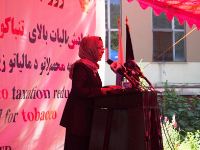 Kabul, 2 June 2014 – Afghanistan’s Ministry of Public Health and WHO celebrated the 2014 World No Tobacco Day on 1 June with the theme “raise taxes on tobacco”. Ministry officials, representatives of nongovernmental organizations and service providers attended the event that focused on the benefits of higher tobacco taxes for the health of the Afghan people and economy.
Kabul, 2 June 2014 – Afghanistan’s Ministry of Public Health and WHO celebrated the 2014 World No Tobacco Day on 1 June with the theme “raise taxes on tobacco”. Ministry officials, representatives of nongovernmental organizations and service providers attended the event that focused on the benefits of higher tobacco taxes for the health of the Afghan people and economy.
In her speech, Minister of Public Health H.E. Dr Suraya Dalil emphasized the devastating health effects of tobacco. “Cigarette smoke produces around 4000 different chemicals, more than 40 types of those being toxic and cancer-causing,” she said. “In addition to cancer, smoking causes heart disease, respiratory problems, high blood pressure and pregnancy complications."
 Dr Arshad Quddus, Medical Officer at WHO Afghanistan, called tobacco “one of the worst enemies of mankind”. Every six seconds someone dies from tobacco use and tobacco is currently responsible for the death of one in ten adults. WHO is actively supporting the fight against tobacco with its partners in Afghanistan by supporting the Ministry of Public Health in public outreach in schools, organizing awareness-raising workshops for the media and reaching out to religious leaders to act as message multipliers on tobacco education. WHO provides technical support to the Ministry in drafting guidelines and action plans and works to strengthen the capacity of national tobacco control officers.
Dr Arshad Quddus, Medical Officer at WHO Afghanistan, called tobacco “one of the worst enemies of mankind”. Every six seconds someone dies from tobacco use and tobacco is currently responsible for the death of one in ten adults. WHO is actively supporting the fight against tobacco with its partners in Afghanistan by supporting the Ministry of Public Health in public outreach in schools, organizing awareness-raising workshops for the media and reaching out to religious leaders to act as message multipliers on tobacco education. WHO provides technical support to the Ministry in drafting guidelines and action plans and works to strengthen the capacity of national tobacco control officers.
Taxation is one of the most cost-effective ways of reducing tobacco use. Higher taxes on tobacco reduce the demand for tobacco use and bring revenue for the government to spend on health programmes. “Higher taxes mean healthier communities and healthier economies. It is a sound policy with a powerful impact,” says Quddus. “By raising tobacco taxes, we can reduce tobacco use and prevent young people from starting to smoke.”
Raising taxes on tobacco is an international legal obligation defined in the WHO Framework Convention on Tobacco Control which Afghanistan ratified in 2010. To implement various articles of the Convention, MoPH has drafted tobacco control legislation which was recently approved by the parliament.
“We are hopeful that in the near future this law will be in place. The implementation of this law in its true letter and spirit would certainly bring immense health, social and economic benefits,” says Quddus.
Data on smoking and its effects on health is limited in Afghanistan. According to the Global Youth Tobacco Survey of 2010, 23 per cent of students aged 13-15 had smoked cigarettes and almost 40 per cent of students live in homes where others smoke in their presence. Another study recently conducted in Kabul indicates that the prevalence of cigarette smoking among men aged 15 years and older is 35 per cent.
“People are not aware of health consequences of smoking, there is a need for more public awareness,” says Dr Adela Mubasher, National Professional Officer at WHO Afghanistan. “We also need to have more data on smoking prevalence among men and women to design effective programmes and interventions that can save lives and further strengthen the fight against tobacco.”
Related link
Raise taxes on tobacco: A sound policy with a powerful impact on health and the economy



